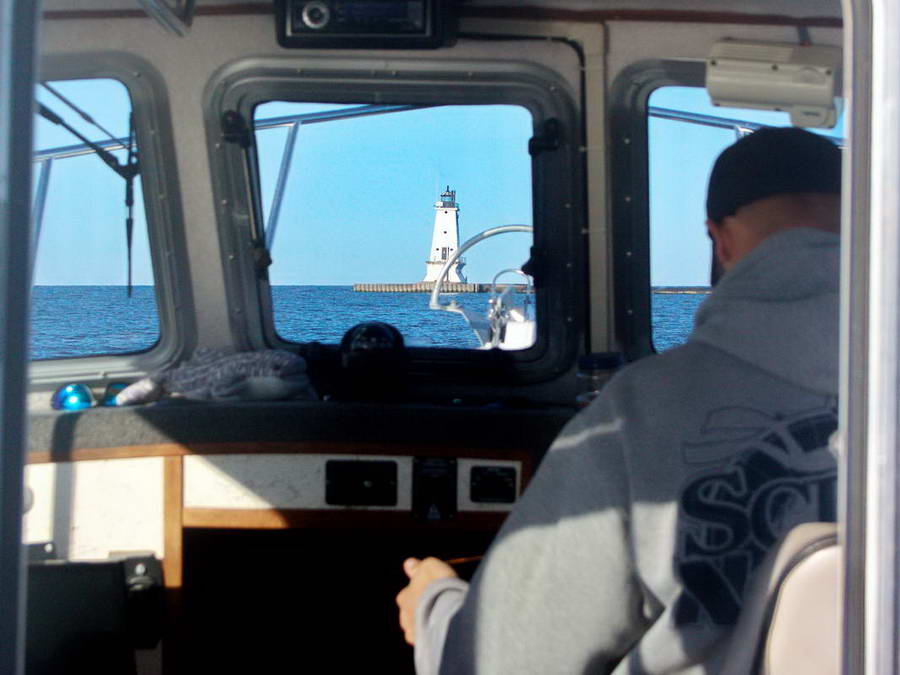I’ve watched countless shows on TV where daring and rugged individuals hunt for lost shipwrecks. The really good shows always seemed to combine a love for history, adventure, and mysteries that got my attention. “Wouldn’t it be cool,” I’ve thought, “to find a lost ship and to tell its story?” But I do not dive, I do not have an ROV, and I do not have a boat. I’m also not a rugged individual, either.
About a year ago, I interviewed Dusty Klifman for a story about shipwreck hunting in the Great Lakes. (It’s a great story; you should read it if you haven’t already). He’s an accomplished diver, shipwreck hunter, and a great guy. We kept in contact off and on, and I eventually offered to do some additional research on a couple of the ships he was looking for–ships that went down and were never found.
The research is the less glamorous side of the endeavour but you come away from it knowing a story that very few people on earth know. You are usually researching a tragedy, at the very least financial, and far too often, human. If there are pictures, you begin to form an image in your mind of the ship, the people, and the sinking. This is all very helpful once you find the ship, but not until that moment. The usefulness of the research comes from the clues that each source may bring. It is these clues that will narrow a search area or, just as likely, land you in the wrong place altogether.
There was one ship in particular that I had done a fair amount of research on. Recently, I was planning to be near the area Dusty bases his searches from, so when he asked if I would like to come along, I jumped at the chance. The biggest challenge was dodging some iffy weather. On a day when we were both available, the forecast promised light and variable winds and a clear blue sky. It was “go time.”
I pulled into Dusty’s driveway shortly after sunrise. This was the first time we met in person, and I think we clicked. Even though we knew that chances of locating the ship were small, we were both enthusiastic. There were big smiles, hearty handshakes, and a lot of optimism. We couldn’t help but say, “Today is the day. The ship will be found.” The stars were aligned. We just had to go out and put in the time and the miles.
I informed Dusty pretty early on to “assume I don’t know how to do anything” when it comes to the boat. Which, as it turns out, was a pretty accurate description of my skills. This was no problem, as he does a lot of these trips solo and putting the boat into the water takes all of about 10 minutes. My job, it turned out, was to stay out of the way and take some pictures. We were both happy with that arrangement.
Once onboard, we would be heading out into Lake Michigan to a spot that was programmed into the GPS. This point was based on the Southwest corner of the search box I had provided him based on the clues we had uncovered from the research. From there, he would set the boat on auto-pilot, and we would watch the sonar as we slowly motored to the northwest corner, about eight miles away. Once on the search, we would be going along at a sedate 3-5 MPH, depending on water conditions and the quality of the sonar data.
Looking out over the water as we headed past the breakwater, he made the comment that with the forecast, he had thought the lake would be calmer. “But hopefully it won’t be too bad.” Uh-oh.
We hammered our way out about 10 miles from shore. The waves came at us, one to two feet high, with four-foot rollers mixed in. The boat bounced, the spray splashed, the wind howled and the sun warmed. It was magical. A never-ending, moving expanse of water so deep blue that it nearly looked black, stretched to the horizon in front of us. The sky itself was a completely different hue of blue, but equally as deep. Dark blue above slowly gave way to a pale white near the horizon. The harbor receded into the hazy distance, slowly losing color and distinction until it became a grey, wavy mass barely poking up out of the water behind us.
Simply glorious.
Once we reached our starting point, Dusty brought the boat to a halt, the motor turning over in a quiet murmuring idle. The boat drifted in the current. He moved to the back and began to lower the sonar into the water, to set it at the proper depth for searching. The boat spun lazily as the breeze caught it, while it drifted in the current. He then moved to the cabin and began to set up the autopilot so it could run our search track. The boat drifted, spun, rocked and bounced as the small waves passed under us and the bigger ones made their presence known.
Nearly instantly, I was seasick.
To my senses, it seemed as if the boat was going in four different directions at once. My brain couldn’t figure out what was going on, so it decided the only course of action it could take was to make my stomach want to heave. The slightly uncomfortable feeling went very quickly from “Oh, that’s a little uncomfortable” to “about to blow chunks” within three minutes.
Since I had an idea about how much time, effort, and money Dusty had put in to make this day happen, I was resolved to tough it out. You never see shipwreck hunters seasick on the TV shows! I was determined not to throw up. Dusty chuckled. He must have been able to see what was happening. “How you feeling, bud?” he said.
“Not great,” was about all I could croak out. I wanted to find something to focus on and something to do to take my mind off my stomach. At the same time, I had to devote about 90% of my mental capacity towards keeping my breakfast from reappearing.
“If it’s too much, just say so, and we will go in,” Dusty assured me as he prepared to get us moving. I was hopeful that once we got going again it would help. He had also given me his iPad, and I could watch the sonar readout live. With the boat under power again, with something to focus on, I was sure to improve.
Yeah. Not so much.
It turns out that slowly running sideways to the incoming waves, which we had to do in order to run the first track, didn’t help. “Look at the horizon,” I thought. “It’s steady. You can see the waves coming. Let’s assist Mr. Brain to make sense of the signals it is getting.” This helped a little. I glanced toward the front of the boat. I could see the bow of the boat turning in front of that steady horizon, turning to the left ever so slowly. Except, according to the navigation map, we were going straight. “Oh no, this isn’t good,” I thought.
A small part of me, whatever was leftover from the internal resources devoted to fighting the sick, felt really bad. Dusty was trying to talk to me, attempting to engage with me about the search. We had both been looking forward to this time to bounce around some ideas and maybe dream about the fame and fortune that didn’t await us should we find the ship.
I really wanted to talk to him, too, but every time I tried, it wasn’t just words trying to get out. Eventually, he said, “Hey bud, if you got those motion sickness things you mentioned, just take one. It might make you drowsy, but it should help the rest of it.” So I did.
For those that don’t know the product, Gravol is an over-the-counter anti-nausea remedy that comes in a little orange chewable tablet. Three of them had been sitting in the center console of my Kia as I pulled into Dusty’s driveway. I had almost left them there in a fit of unwarranted bravado. But no, I had given in, and now they were going to save me. I popped the tablet and chewed with a mouth so dry I could barely get the stuff down my throat. I began the wait for things to calm down in my belly.
We sat in comfy canvas chairs in the back of the boat. I was wearing dark clothes which were soaking up the warm sun while a cool lake breeze blew. The waves were still rocking the boat. The motor was purring along. I found that if I closed my eyes, it made the sea-sickness better, too. I said to myself, “This is what I had come for, this was going to be a good experience.” I thought about how cool this was. I thought about how lucky I was to have this opportunity. Dusty was saying something to me, too.
Then I opened my eyes. One of the first things I noticed was how much of the track we had covered. “I, uh, must have dozed off,” I admitted.
He laughed. “You sure did! Don’t worry about it, you didn’t miss much.” The next couple of hours were much the same–periods of full consciousness, aware of my bad, but not terrible, guts interspersed with periods of less consciousness. Somewhere in there, we made the turn and began heading south again; the second track had started.
I slowly, gradually, began to perk up. I found I could watch the sonar on the tablet without aggravating my motion sickness if I took long glances at it and then looked away. I started to carry on a conversation with Dusty. I was, finally, searching for a shipwreck.
The thing is, there isn’t an awful lot to do. Dusty spends his time cleaning the boat and eating chocolate cupcakes. The boat’s autopilot drives a straighter line than any person could so he only has to keep an eye out for other boats and make the occasional check to ensure things are going the right way. The sonar readout gives a 10-minute history, too, so you can do other things and then go back and see if anything looks promising.
When you are watching the sonar you are seeing a depiction of the lake bottom about 1200 feet to either side of the boat. The closer it is to the center of the scan, the more detailed it gets. You watch as the bottom rises and falls. You see ridges, hills and holes in the lakebed. Sometimes, something that doesn’t look natural appears and Dusty takes control of the boat and circles around it, trying to see the feature in the sonar from different angles. Sometimes it is a school of fish, other times it’s something else, just not an old steel ship.
We spent around eight hours total on the water. We did two long tracks and managed to eliminate an interesting target he had found in a past search. We identified a 16 x ½ mile swath of water where the lost ship isn’t. That is progress in the shipwreck hunting world.
While I could have done without the ever-present sea-sickness, it was never lost on me just what was happening. We were trying to solve a mystery. Each line, composed of brighter and darker pixels that came down the sonar display, might be the start of unravelling what had happened over a century ago. In my waking moments, I was keenly aware of how tuned in I was; I could watch that sonar screen for hours. In my sleeping state, I was dreaming about watching the sonar, finding the ship. I was all in.
It was always a long shot to find the ship that day. In truth, any day you go out to search is. The thrill is in knowing that at any moment, right up until you end your search day, the sonar could reveal what you are looking for.
I’d like to go again. I have the bug. All the stuff in the shipwreck hunting shows that they don’t spend time on, like the hours of research with old news articles and obscure documents in various archives, or watching a sonar display draw out an endlessly flat lakebed, is all the stuff that I can do for hours on end.
I learned that I’m a background guy who isn’t bothered by the “dull bits,” mostly because you never know which moment will be the important one. I loved watching that sonar; I was fascinated by it, actually. I’ve already done the research on how to reduce or prevent seasickness, so hopefully, I would do better if I get another chance to go.
That ship is still out there, somewhere. More than anything, I want Dusty to find it. But, boy, would it be awesome to be there when he does.









A pain I know all to much about! Reminds me of a whale watching trip I took out east. If I hadn’t been so cocky with my father in law about the waves, the sting of me feeding the whales while everyone else watched them might not have hurt so bad!!
I wasn’t sure if feeding the fish would make things better or worse, to be honest!